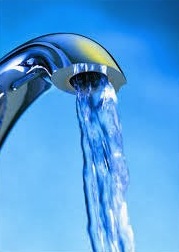Categories: Featured Articles » Electrician Secrets
Number of views: 99496
Comments on the article: 11
When washing hands, it is shocking - how to solve this problem
 Nibbling of hands, especially wounds, scratches during their contact with water when washing hands does not pose a danger to humans. But light and seemingly harmless tingling can instantly turn into a strong electric shock. Tingling can be considered as an alarm signal, namely, to search for a source of current leakage - a damaged electrical appliance or go to a damaged section of home wiring.
Nibbling of hands, especially wounds, scratches during their contact with water when washing hands does not pose a danger to humans. But light and seemingly harmless tingling can instantly turn into a strong electric shock. Tingling can be considered as an alarm signal, namely, to search for a source of current leakage - a damaged electrical appliance or go to a damaged section of home wiring.
In most cases, the cause of tingling is damage or improper connection to the electrical network of a household appliance, which in the process of operation is connected to water, pipelines of the apartment (house). This is primarily a washing machine, storage water heater (boiler), instantaneous water heater, dishwasher.
When installing electrical wiring, it is recommended to pay special attention to the degree of protection of the housing of the wiring elements from moisture. Very often, this recommendation is neglected and a socket, switch, lamp or other element of a home electrician is installed that does not have sufficient protection from moisture, which should be in one case or another.
For example, an unprotected outlet was installed in the bathroom. Such a socket, in the event of moisture, can leak and pinch a person in case of touching a wet wall or using tap water. With direct contact with wet hands to an unprotected outlet, there is a high probability of electric shock to a person.
In this case, to prevent the occurrence of current leakage, it is necessary to install power sockets, lighting switches, enclosures of junction boxes, fixtures and other wiring elements with reliable protection of the enclosure from moisture. More details about the features of the installation and use of outlets in wet rooms are described in detail here: Outlets in the bathroom
When choosing these elements, attention should be paid to their design features, since the degree of protection of the case that is not always declared does not correspond to the actual one. It is necessary to visually verify that the housing of the socket, switch or other element is tight enough, and their live parts are reliably insulated.
You should also remember the safety measures when operating electrical appliances in the bathroom or in another room with high humidity. For example, the presence of protection for the housing of the outlet against direct water jets does not mean that the outlet must be constantly exposed to direct moisture. This outlet must be installed in a place where the likelihood of direct splashing of water is minimal.
 The best option in terms of security is minimize the number of wiring elements installed in a room with high humidity. For example, it is better to install the bathroom lighting switch outside. If there is a need for branching the wiring line or connecting the appliance directly to the wiring, it is better to provide for the installation of a junction box outside a room with high humidity.
The best option in terms of security is minimize the number of wiring elements installed in a room with high humidity. For example, it is better to install the bathroom lighting switch outside. If there is a need for branching the wiring line or connecting the appliance directly to the wiring, it is better to provide for the installation of a junction box outside a room with high humidity.
When searching for a source of current leakage in a bathroom or other room, you should pay attention to what other household consumers of electric current can leak. One such instrument is warm floor.
The cause of leaks, which in turn leads to pinching of a person in the room when in contact with moisture, may be damage to the cores of the heating floor heating cable or a violation of the rules for connecting electrical appliances to the electrical network in a room with a high level of humidity, as mentioned above.
If in the latter case the problem of tingling can be solved by connecting the heated floor to the electric network in accordance with the standards, then in case of damage to the insulation of the heating elements of the heated floor, it will be necessary to replace the heated floor in the room. It will not be possible to eliminate the breakdown of the insulation of the heating elements of the warm floor, since they are hidden by a screed, when removed, the warm floor will be absolutely unsuitable for further operation.
As mentioned at the beginning of the article, the presence of leaks from household electrical appliances is very dangerous for a person’s life, as light tingling can turn into a person’s shock with a leaking current. Therefore, you should not hope that if you find a damaged item, you will be protected.
Damage to the wiring or electrical appliances used in everyday life can occur again at the most inopportune moment. Therefore, it is necessary to provide the required safety measures against possible leakage of current through the damaged insulation of electrical appliances or wiring.
One of the main safety measures - the installation in the apartment switchboard of a residual current device or a combined electrical apparatus - differential automaton.
These protective devices, when the threshold value of the leakage current is reached, will instantly turn off the section of the electrical network with damage that led to the occurrence of current leakage. An RCD or a difavtomat must be installed on those wiring lines that supply the most dangerous electrical appliances from the point of view of electric shock.
Also, one should not forget that the RCD, like any electrical device, can fail and not work at the right time. Therefore, an introductory protective device that acts as a redundant protective device should be provided in the electrical switchboard.
In addition to protective devices, for the safety of people during the operation of home electricians and electrical appliances included in the network, the presence of protective grounding in electrical wiring.
There are also cases when the home wiring and electrical appliances used are in good condition, but the tingling does not stop when washing hands.
In this case, the cause of this phenomenon may be damage to the wiring in the neighboring apartment, the deliberate use by the residents of the house of pipelines as a ground electrode. In this case, it is necessary to contact the sales organization in order to search and eliminate such violations.
See also at bgv.electricianexp.com
:
